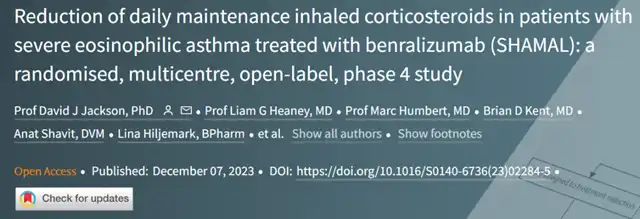Over 90% of severe asthma patients can safely reduce corticosteroid dosage
- Normal Liver Cells Found to Promote Cancer Metastasis to the Liver
- Nearly 80% Complete Remission: Breakthrough in ADC Anti-Tumor Treatment
- Vaccination Against Common Diseases May Prevent Dementia!
- New Alzheimer’s Disease (AD) Diagnosis and Staging Criteria
- Breakthrough in Alzheimer’s Disease: New Nasal Spray Halts Cognitive Decline by Targeting Toxic Protein
- Can the Tap Water at the Paris Olympics be Drunk Directly?
Over 90% of severe asthma patients can safely reduce corticosteroid dosage
- Should China be held legally responsible for the US’s $18 trillion COVID losses?
- CT Radiation Exposure Linked to Blood Cancer in Children and Adolescents
- FDA has mandated a top-level black box warning for all marketed CAR-T therapies
- Can people with high blood pressure eat peanuts?
- What is the difference between dopamine and dobutamine?
- How long can the patient live after heart stent surgery?
Impact on nearly 300 million people worldwide! The Lancet: Over 90% of severe asthma patients can safely reduce corticosteroid dosage.
Asthma is one of the most common respiratory diseases globally, affecting nearly 300 million people. According to statistics, around 3% to 5% of asthma patients have a severe form of the condition, characterized by poor symptom control and frequent acute exacerbations.
Most of these patients suffer from severe eosinophilic granulocyte-predominant asthma with uncontrolled eosinophilic Type 2 inflammation.
Gradual escalation of inhaled corticosteroids (ICS) is a conventional approach to treating severe eosinophilic granulocyte-predominant asthma, but some patients respond poorly to high-dose ICS. White blood cell interleukin (IL)-5 is widely associated with eosinophilic cell inflammation in asthma.
Benralizumab, a respiratory biologic, is an anti-IL-5 receptor alpha monoclonal antibody that induces eosinophil depletion directly, rapidly, and almost completely through antibody-dependent cell-mediated cytotoxicity.
The “Global Initiative for Asthma” emphasizes that excessive use of short-acting β2 agonists increases the risk of worsening the condition.
It recommends ICS-formoterol (β2 agonist) as maintenance and anti-inflammatory relief therapy (MART) for optimal results.
Additionally, it suggests reducing ICS dosage as much as possible in patients who positively respond to biologics. However, clinical evidence regarding the safety and extent of ICS dosage reduction is limited.
A study published in The Lancet, known as SHAMAL, reveals that patients treated with benralizumab can safely reduce ICS-formoterol dosage while maintaining asthma control.

This 4-phase, multicenter, randomized, open-label, active-controlled clinical trial, conducted from November 12, 2019, to February 16, 2023, across 22 research centers in 4 countries, included adults (aged ≥18) with severe eosinophilic granulocyte-predominant asthma who had received benralizumab treatment (≥3 doses) before screening and had controlled asthma (Asthma Control Questionnaire 5 items [ACQ-5] score <1.5 at the first visit).
A total of 168 patients were randomly assigned in a 3:1 ratio to the ICS reduction group (gradual reduction from high to medium, low, and as-needed doses, n=125) or the control group (continuing ICS-formoterol, n=43) for 32 weeks, followed by a 16-week maintenance treatment period.
The primary endpoint was the proportion of patients with reduced ICS-formoterol dosage at week 32. The average age of patients was 57.7 years, with 89 females (53%).
Among the 168 patients, 154 (92%) completed the study, while 14 (8%) discontinued, with the most common reasons being discontinuation of medication (8 cases [5%]), adverse events (2 cases [1%]), protocol deviation (2 cases [1%]), lack of efficacy (1 case [<1%]), and other reasons (1 case [<1%]).
Overall, 110 out of 119 patients (92%) in the reduction group maintained the same ICS-formoterol maintenance dose at the end of the reduction period (week 32): 18 patients (15%) reduced to a medium dose, 20 patients (17%) reduced to a low dose, and 72 patients (61%) only reduced on an as-needed basis.
In the reduction group, 113 out of 118 patients (96%) maintained the same ICS-formoterol daily dose from the end of the reduction period (week 32) to the end of the maintenance period (week 48).
Additionally, 114 patients (91%) in the reduction group experienced no acute exacerbations during the gradual reduction period. Adverse event rates were similar between the two groups, and no deaths occurred throughout the study.
In summary, these results suggest that patients treated with benralizumab can significantly reduce ICS-formoterol treatment while maintaining asthma control.
Over 90% of severe asthma patients can safely reduce corticosteroid dosage
(source:internet, reference only)
Disclaimer of medicaltrend.org
Important Note: The information provided is for informational purposes only and should not be considered as medical advice.



